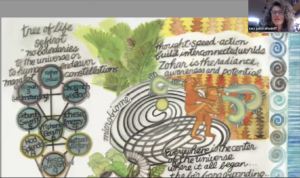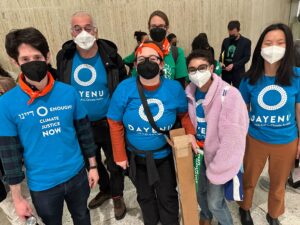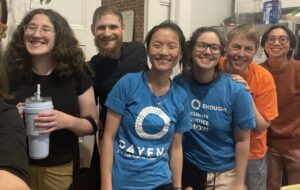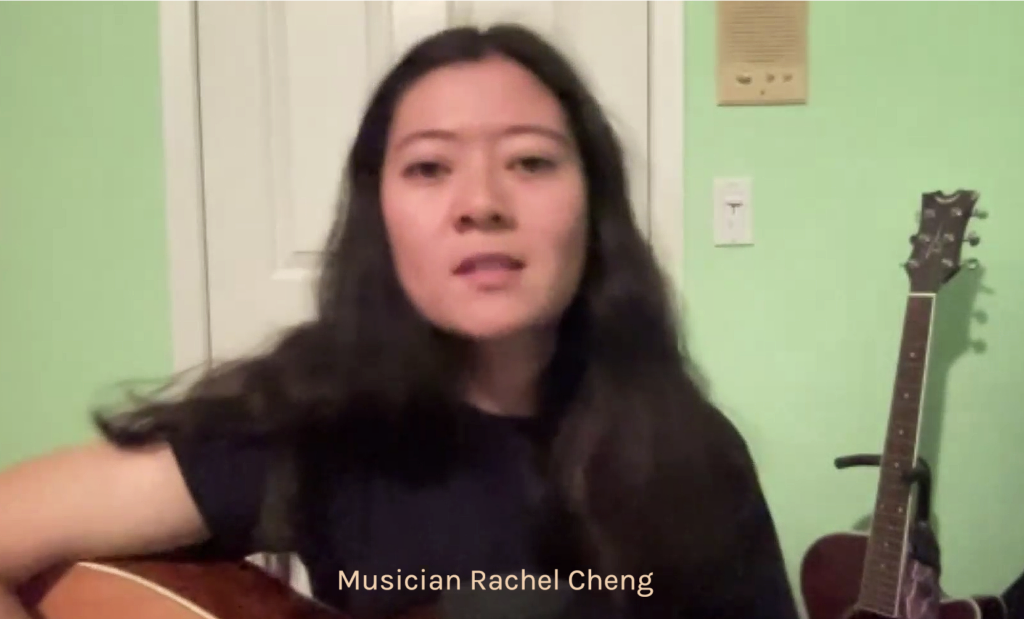For the first time in Dayenu history, the Jews of Color (JOC) Caucus organized a dedicated Chutzpah 2024 phonebank shift. Maetal Gerson, Organizing and Leadership Development Fellow at Dayenu and a second year rabbinical student at the Jewish Theological Seminary, spoke to us about the shift and her hopes for the future of the Caucus.
Maetal: The JOC Caucus phonebank shift was very sweet. Coming together as a JOC community and making these calls gave us a sense that we were doing this intentionally – to build our relationships as a community committed to action and to supporting one another.
We were building our movement – as well as calling folks who may share experiences as people of color with our votes being suppressed in various ways.

Rachel Cheng (in the photo above) performed her song called “Tivu, Tivu.” Since the shift was close to Sukkot, the song was about welcoming people into the sukkah, and set the tone of this phonebank being a calling-in space for the community. It was absolutely beautiful and people really found a lot of comfort in it.
Dr. Cara Judea Alhadeff, another JOC Caucus member, gave a kavanah (inspirational teaching) and shared words about her book called Zazu’s Dreams, guiding us to feel aware of our innate power as spiritual beings in order to better respond to the systems of oppression that continue to bind us.
Dayenu: It seems like the Caucus was very engaged in Chutzpah 2024 overall?
Maetal: Yes, at least two Caucus members organized their own phonebank shifts in person.
And several JOCs gave kavanot and performed live music during the shifts. Laura (Rabbi Laura Bellows, Dayenu Director of Spiritual Activism & Education) was very intentional about making sure that we had a number of JOCs involved, so that was great.
Dayenu: Can you give us a sense of how you organize a positive space for people at the Caucus meetings?
Maetal: We do our best to create a space where we can talk about collective climate grief and how it’s weighing on us specifically as Jews of Color. We really want the space tobe community-oriented and give us a moment to heal together.
In every meeting people bring up just how much the climate crisis affects communities of color, and how coming together and defining our voice against the climate crisis as a JOC community feels like a very powerful way of combating it. There’s awareness that our communities are being directly affected and a will to work against that.
We try to build, and to realize that we have power together, and to use that collective power to organize. We can better strategize on how to organize and take a role in these campaigns that doesn’t feel kind of exploitative and that doesn’t feel like we’re tokenized – but as also meaningful that helps the JOC community and lends to the climate fight in a kind of a deep and Jewishly rooted way.
It’s really important to members of the Caucus that this is a Jewish space and that we’re approaching this from a Jewish perspective.

Dayenu: So the particular combination of people of color, who take their Judaism seriously, who take climate seriously – those three intersecting identities – is there something about that that is particularly powerful?
Maetal: Yeah definitely, there’s a few different needs of this community and also individuals that’s developed over the past few years.
A lot of JOC spaces are in affinity with people of the same ethnicity. (Asian, Black, Latinx). Then there are organizations that offer Jewish places to gather on the climate.
But, to have a space to recognize both as part of our identity is very important. People have said that specifically that combination is extremely important especially in these times when there’s so much strife going on in Jewish communities.
It’s important because sometimes people feel more free to share without feeling like their words are going to be misinterpreted or that they’re going to be put in some kind of box.
Dayenu: How are people in the Caucus feeling about the election results?
Maetal: People are scared and upset and exhausted. But there’s a feeling of – well, I was already fighting this fight, and this is a continuation of that fight.
So it’s a shock to the system, but I think intellectually people are not so surprised. There’s a feeling of frustration, and acknowledgement that our movements need to start from a place of listening in order to be successful and supportive. This is addressable, it’s scary, we’re going to have to be there – it’s actionable.
Dayenu: The Caucus has been around for a couple of years – can you talk about where Jews of color have been finding each other?
Maetal: A lot of Jews of color are connected to specific organizations such as The Lunar Collective (the Asian Jews of color group), Ammud (the Jews of Color Torah Learning Academy), and Jewtina (the Latinx Jews of Color organization).
We have relationships with those organizations, and our events are shared with them – people who are interested in climate action find us through those routes.
Dayenu: Any final words?
Maetal: I’m excited for what comes next! I’m looking forward to seeing how these leaders develop – we have a deliberate strategy to encourage participants to become leaders in their communities.


